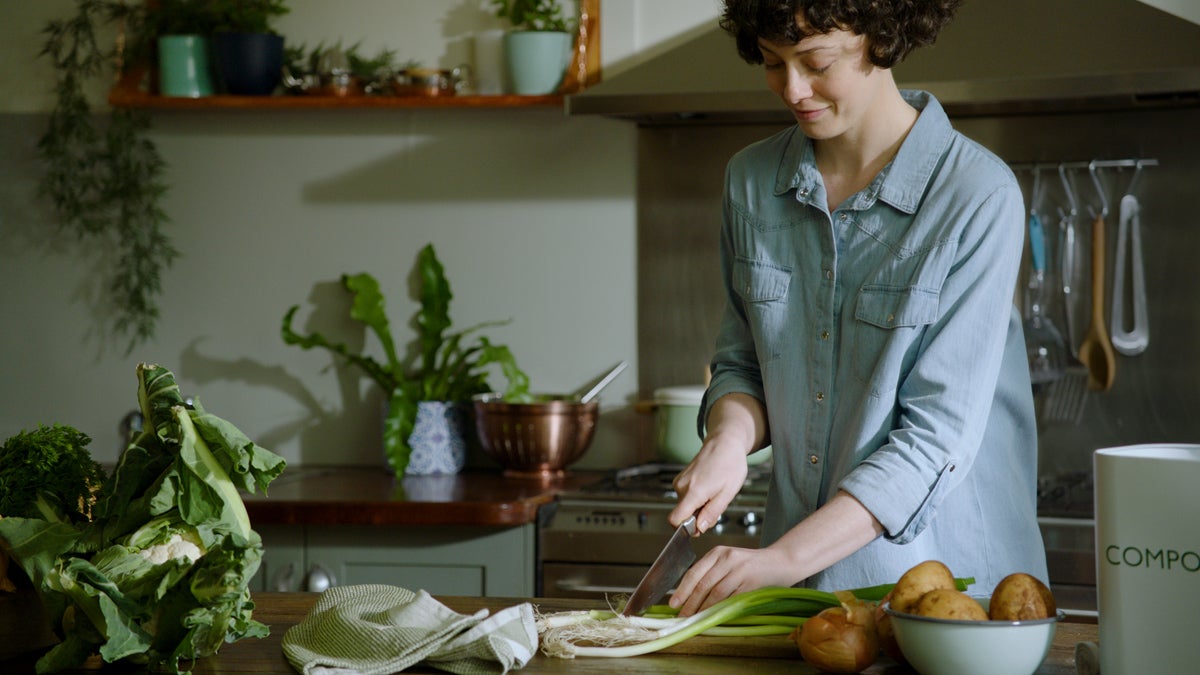
Easy wins for the planet: Your food waste questions answered
Reduce, reuse, compost - am I doing it right? Top tips from waste expert Kate Meads.Many shoppers today aim to make sustainable choices at the supermarket, but it can be tough to know which behaviours make a difference – as well as what purchases might look good on the outside, but may not actually be as green as they seem.
Here to chip in and offer her advice is Kate Meads, food waste expert and Founder of Waste Free with Kate. She’ll give us tips and advice on reducing food waste, as well as knowing what to look for when shopping for composting materials.
Q. So Kate, from your perspective, what’s the best way to reduce food waste?
A. “The biggest issue most households face with food waste is that we generally either buy too much or cook too much – or both. The easiest way to reduce wasted food is to not buy it in the first place, so only buying what we need, and eating what we buy.”
“Humans are habitual eaters. We’ll go to the store, buy our usual broccoli and lettuce, and then go out to dinner because we’re sick of broccoli and lettuce! One of the reasons this happens is because we’ve gotten out of sync with seasonal produce, so we end up eating lettuce in winter when we should be eating winter veggies. Eating seasonally means you change up your diet, which means you don’t get sick of food, which means you actually end up eating it – plus it’s far more affordable to shop in season.”
“Last but not least, something to start having a look at is whether the food waste going into your organics collection is avoidable (things like leftovers) or unavoidable food waste (like peelings or coffee grinds). If your compost bin is full every week, you’ve got to look at why!”
Q. On the topic of composting, we’d love to pick your brain on what happens to compostable materials when they end up in landfill.
A. “To put it simply, landfill isn’t a compost. In order for compostable materials to actually break down, they have to be composted in a compost system.
“Around 50% of New Zealand’s household waste going into landfill is food and green waste (organics), which can create a huge amount of methane (a greenhouse gas) when it’s sealed in landfill and dries out, essentially mummifying, and then it sits there for hundreds of years alongside other rubbish.”
“The issue I have with off-the-shelf compostable products like your coffee cups, or packaging or bin liners, is that people think they’re doing the earth a favour, when in actual fact that material going into landfill is either going to create more greenhouse gas or sit in landfill, or in some cases both.”
Q. So in your opinion, how (if at all) should we be using things like compostable bin liners?
A. “If you’re using compostable bin liners to send waste to landfill, you’re probably spending more money on a product that is no better for the environment, and in fact is sometimes worse.”
“If you need to line your bin I’d suggest instead buying a recycled plastic bin liner because at least it’s had a prior life. A compostable bag is still a single use bag that will have an impact in landfill and still be there in hundreds of years.”
“Another thing to note here is that compostable materials, including bin liners, packaging, cups etc., should not be recycled or used to contain recyclables – they contaminate the mixed recycling stream, they contaminate soft plastic, and they don’t break down in landfill.”
Q. Thanks Kate. If you had to leave supermarket shoppers with one key message, what would it be?
A. “The average consumer cares and wants to do the right thing, but when you’re looking at these products on the supermarket shelf, it’s hard to tell what’s actually going to make a difference and what’s a load of hogwash.”
“If you’re going to line your bins, go with something recycled. I know companies such as GLAD® have products with up to 95% recycled plastic which is what I’d choose if I was reaching for a bin liner. Be aware of greenwashing, be aware of where you’re spending your money, and do your research.”
Explore the GLAD TO BE GREEN® range here.
Originally published by Stuff media

